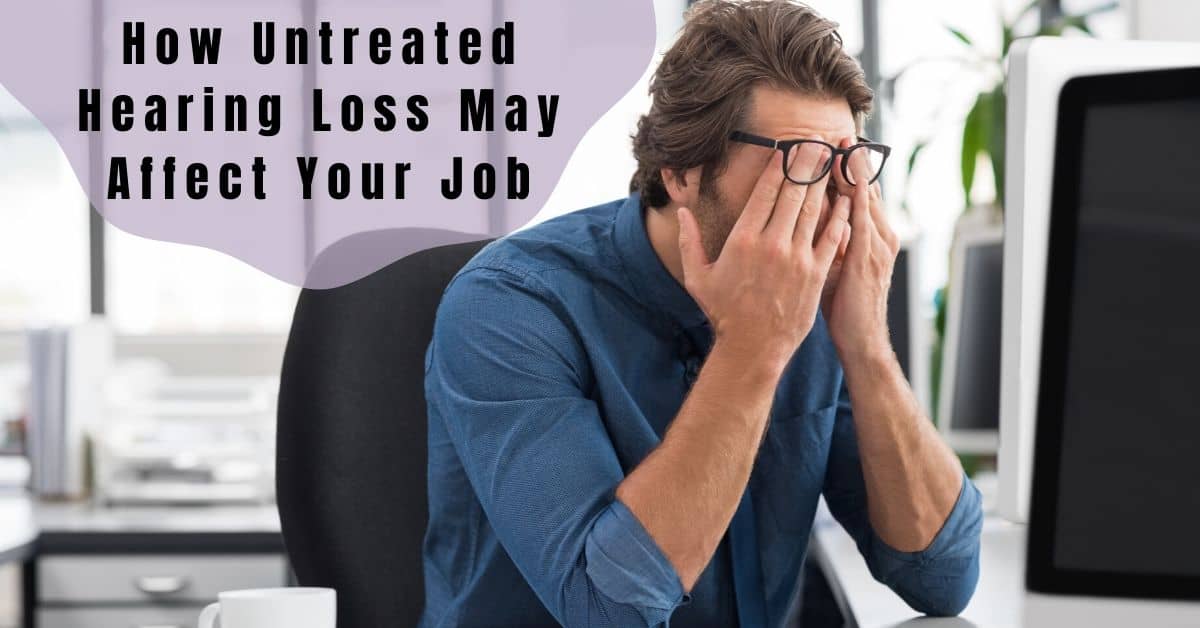
- Common Misconceptions That Delay Hearing Loss Diagnosis - June 6, 2025
- Signs Your Earwax Buildup Needs Professional Attention - May 29, 2025
- Preparing for a Hearing Test and What You Should Bring - May 16, 2025
Have you recently been in a noisy environment that made listening a challenge? Whether at a very loud restaurant, at a music concert, or even in a bar, you had to shout to have a conversation with your friends. You got home exhausted, and may even have felt the effects of all that noise the next day. Now imagine living with hearing loss, and feeling that struggle to communicate in each and every situation. If you have untreated hearing loss, it’s affecting both your personal and professional life, and you’ll struggle to hear in almost every environment.
How Hearing Loss Affects Your Job
Did you show up for a meeting at 7am instead of 6am? When you struggle to hear at work, mishear instructions, or can’t hear what’s being discussed in a meeting, your job performance will suffer, and the whole team will be weaker since you’re not able to add your valuable insight to the conversation.
This communication breakdown will lead to costly or even dangerous mistakes, and you may even lose your job.
Hearing loss can also be a safety hazard at work. Being alert and aware of your surroundings is the best way to keep you and everyone around you safe, but if you have hearing loss you might not hear the beeping of heavy machinery, a warning bell, or the shout of a colleague from across the room. Hearing loss affects your safety on and off the job site, and you may be putting yourself and your coworkers in danger.
Your Job Could Be Causing Hearing Loss
Roughly 22 million Americans in the workforce are exposed to dangerously loud sounds as part of their jobs. Construction workers, factory workers, farmers, air traffic controllers, and law enforcement officers are among the most at risk, and if you work in one of these industries, your job could be causing hearing loss. Being exposed to dangerously loud noises each and every day puts a huge strain on your ears, and you’ll feel exhausted by the end of the day. Some sounds are so loud they can cause hearing loss in just a few minutes, and millions of Americans are at risk of noise induced hearing loss at their place of work.
Why Don’t Workers Protect Their Hearing?
When you’re working in a loud environment, you know you should wear hearing protection, but you may be tempted to remove your protection to speak to a coworker or listen to a machine to check for strange noises. You may even take off your hearing protection because it makes sounds around you seem muffled. If you work in an environment that’s relatively quiet, but there are occasional extremely loud sounds, it can be hard to wear hearing protection through the quiet moments to protect your ears from the loud moments. Sadly, failing to wear the appropriate hearing protection at work will often lead to noise induced hearing loss, and affect your job performance and your home life.
Signs of Hearing Loss
Do you have hearing loss? If you feel as though you haven’t been hearing clearly, or have been missing important details and making frequent mistakes on the job, you may have hearing loss. Common signs that you’re not hearing clearly include:
- Saying “what?” repeatedly during conversations
- Turning up the TV volume until family members complain it’s too loud
- Forgetting to turn off the turn signal while driving because you can’t hear the indicator noise
- Struggling to hear during conversations
- Having a hard time following what a coworker has said, or hearing during meetings
- Feeling embarrassed that you can’t hear what’s been said, and answer inappropriately
Wear Hearing Protection
It’s tempting to remove your hearing protection or alter it to help you hear some subtle sounds in the environment. However, when you don’t wear hearing protection on the job it’s only a matter of time before the cells in your ear are damaged, and you experience hearing loss or tinnitus, that annoying ringing sound you sometimes hear in your ears. Always wear hearing protection on the job, and if your hearing protection doesn’t fit appropriately, or doesn’t let you hear all the sounds you need to hear, find earmuffs that fit more snuggly, or invest is digital hearing protection that won’t muffle all the sounds around you.
